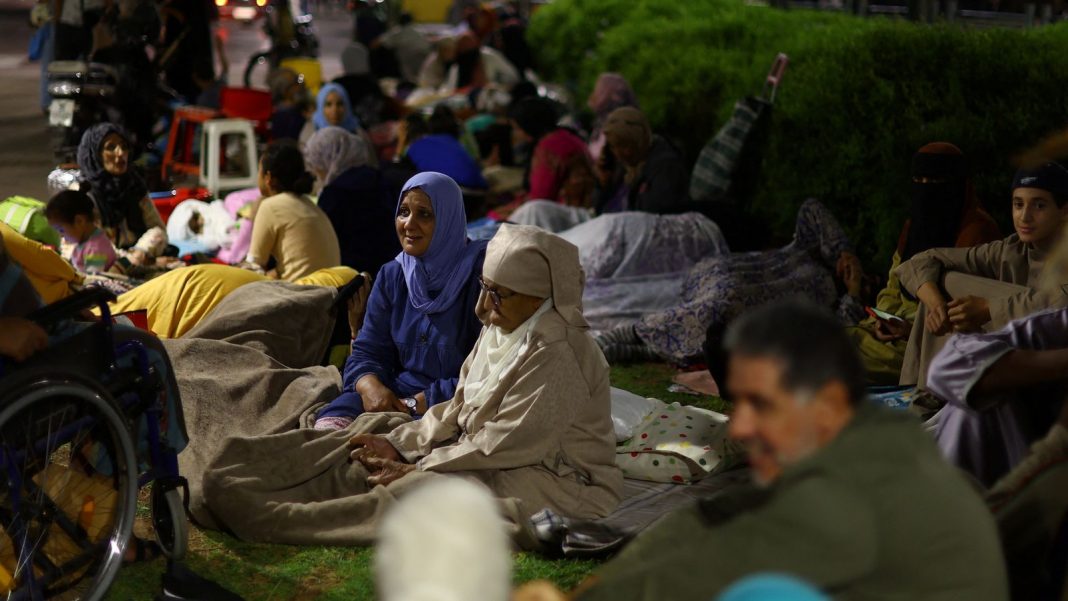Thousands of people who survived the Morocco earthquake have spent the night sleeping rough – with many losing their homes or too fearful to head indoors.
At least 2,012 people have died following the powerful 6.8 magnitude tremor on Friday night, and 1,404 others are critically injured.
These numbers are only expected to rise as search and rescue crews battle to access hard-to-reach mountainous areas that have lost electricity and mobile phone reception.
Morocco earthquake – latest updates
Bereaved families have been burying their loved ones, and some of those who lost everything in the earthquake lack the financial means to rebuild.
The World Health Organisation says more than 300,000 people are living in the hardest-hit areas, and experts have warned the next 48 hours will be “critical” for saving lives.
Caroline Holt, from the International Federation of Red Cross and Red Crescent Societies, said safe drinking water is urgently needed to prevent “a disaster within a disaster”.
The humanitarian organisation has warned it could take months, if not years, for Morocco to recover.
Please use Chrome browser for a more accessible video player
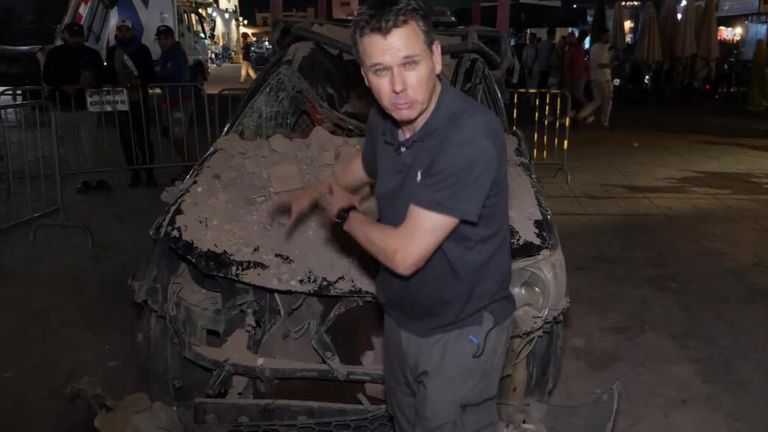
0:55
Quake damages Marrakech landmarks
World leaders offer aid
The president of Turkey, which lost tens of thousands of people in a devastating earthquake earlier this year, is among those offering to send aid and rescue crews.
France and Germany, which are both home to a large population of people with Moroccan origin, have also said they are prepared to step up.
And in an exceptional move, neighbouring Algeria – which severed diplomatic ties with Morocco in 2021 – offered to open its airspace for humanitarian aid and medical evacuations.
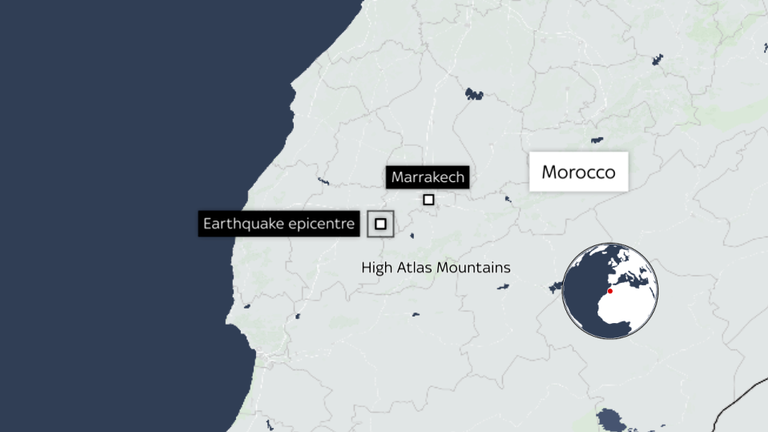
The epicentre of the earthquake is in the High Atlas mountains, about 50 miles south of Marrakech
The British Red Cross has launched an emergency fundraising appeal, amid fears that “the full scale of the destruction is only likely to become apparent in the coming days”.
Despite the outpouring of offers, the Moroccan government is yet to formally ask for assistance – a crucial step before international rescue crews can head to the scene.
Sky’s Europe correspondent Adam Parsons said a team from the Netherlands was already waiting at an airport in Amsterdam for permission to travel.
In the meantime, the Moroccan armed forces have begun deploying rescue teams to distribute clean drinking water, food, tents and blankets.
There are two sides to Marrakech now
On the one hand, the city is still bustling and chaotic – a home to many tourists. There were plenty of people walking around the centre, or enjoying a drink and a meal.
But dig a little deeper and there are scars. Everyone has a story of where they were, and how it felt when the earthquake happened.
‘It felt like a bomb went off’
Whole communities have been covered in debris and neighbours are working together to reach those who are trapped, some picking through rubble with their bare hands.
Near the epicentre, fallen masonry is blocking narrow streets – and in remote areas, food is in short supply because roofs collapsed on kitchens.
Some of those who survived fear they have little future to look forward to.
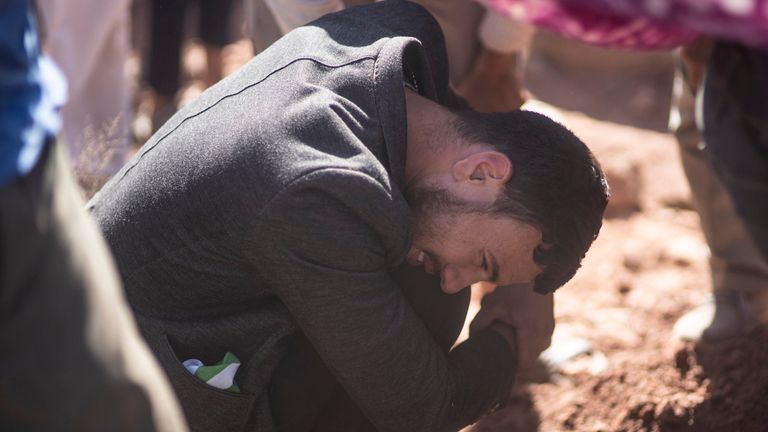
Pic: AP
Hamid Idsalah, a 72-year-old mountain guide, said: “I can’t reconstruct my home. I don’t know what I’ll do. Still, I’m alive, so I’ll wait. I feel heartsick.”
There have also been stories from those who are lucky to be alive.
Mohamed Azaw said: “When I felt the earth shaking beneath my feet and the house leaning, I rushed to get my kids out – but my neighbours couldn’t.
“Unfortunately no one was found alive in that family. The father and son were found dead and they are still looking for the mother and the daughter.”
Read more:
Morocco’s deadly earthquake – in pictures
Please use Chrome browser for a more accessible video player
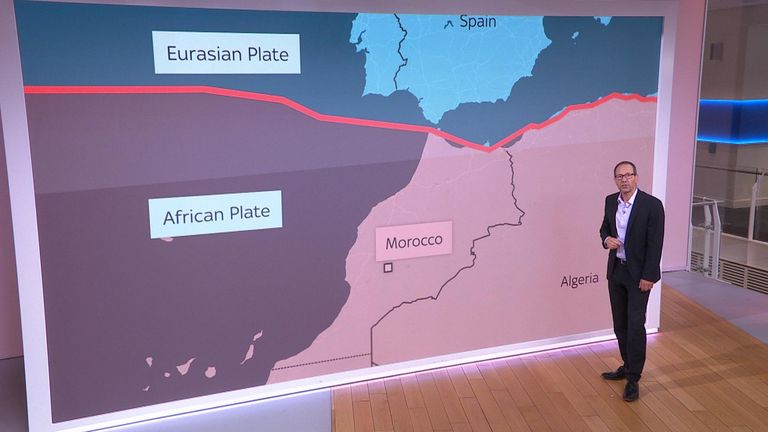
1:40
‘Once in a lifetime’ earthquake
Three days of national mourning
This is the deadliest earthquake to hit Morocco since 1960, when a 5.8 magnitude tremor killed at least 12,000 people.
While construction laws were changed in cities after that disaster, many rural homes are made from mud brick, stone and rough wood.
Professor Bill McGuire from University College London said: “The problem is that where destructive earthquakes are rare, buildings are simply not constructed robustly enough to cope with strong ground shaking, so many collapse, resulting in high casualties.”
Morocco has now declared three days of national mourning – with King Mohammed VI ordering the armed forces to mobilise specialised search and rescue teams, as well as a surgical field hospital.


